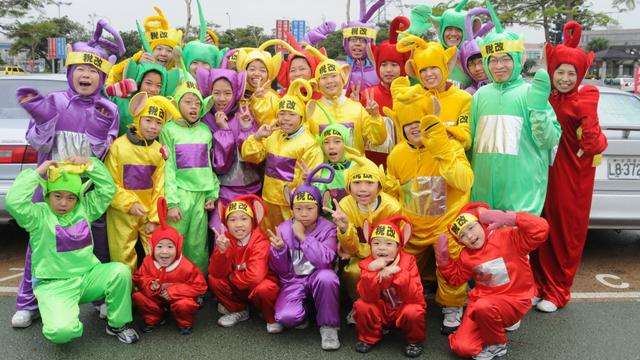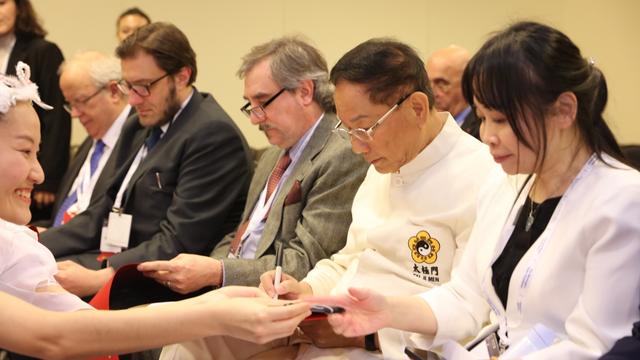An article on a large-circulation Italian daily newspaper explains that all that glitters is not gold in Taiwan.
by Marco Respinti*
* Published with the title “C’è un giudice a Taiwan che ce l’ha con il Kungfu,” in “Libero quotidiano,” vol. LVIII, no. 34, Milan, February 4 2023, p.17. The number of those who rang the Bell of World Peace and Love and other details have been updated in the translation.

Taxes? They are a weapon of mass persecution. Tai Ji Men, a Taiwanese spiritual school persecuted for more than twenty-five years for a tax offense that, according to Taiwan’s Supreme Court, it never committed, knows it all too well.
The whole story is told in the book “Who Stole Their Youth” (2021) and in a collections of articles from the online magazine on religious liberty “Bitter Winter,” published in two installments: “The Tai Ji Men Case in Taiwan, Part One” (2021), and the “Part Two,” which was presented at the prestigious International Religious Freedom Summit 2022 in Washington, D.C. The story is also explained in two websites, act1219.org and TaiJiMenCase.org.
Tai Ji Men is a menpai (school) of qigong (the “gymnastics” related to traditional Chinese medicine), martial arts, and self-cultivation. Legally registered in 1966 by its Zhang-men-ren (Grand Master), Dr. Hong Tao-Tze, it has tens of thousands of dizi (disciples) mainly in Taiwan, a fertile ground (along with South Korea) for spiritual movements. Rooted in esoteric Daoism (the philosophy of yin-yang, the “Kung Fu of the heart,” and so on), its mission is promoting universal harmony.
Through the Federation of World Peace and Love, created in 2000 in the United States (and with members in 137 countries), Tai Ji Men promotes thousands of events, some of them culminating in the ritual ringing of the Bell (a high symbol in Chinese culture) of World Peace and Love. 464 personalities from 128 countries have taken part in that ceremony, including 51 heads of state or government, 7 Nobel Peace Prize laureates, ambassadors and UN officials, and cultural leaders. Through the Movement of An Era of Conscience, initiated in 2014, the movement helped having April 5 proclaimed as the UN’s International Day of Conscience in 2019.

Mayor Cashenna A. Cross of the City of Glenarden, Maryland, a decorated retired veteran of the United States Air Force, rings the Bell of World Peace and Love in Washington DC in 2023.
When the Communists seized power in Mainland China (1949), Kuomintang nationalists repaired to the Island of Formosa, Taiwan, and proclaimed Martial Law there. Among other things, they revamped the notion of “xie jiao”: spiritual groups regarded as hostile to the government and included in a proscription list. Red China today uses the label “xie jiao” (literally, “heterodox teachings”) to target dissident groups as “cults.” Which groups are “cults” is decided by the Communist bureaucrats who prepare the lists of xie jiao. In Taiwan, the practice of political ostracism against groups accused of not supporting the government has continued in a democratic garb even beyond the period of Martial Law, which was abolished in 1987.
1996 was the year of the “great purge.” The spiritual movements that did not support the government ended up among the reprobates. Among them were the Buddhists of the Fo Guang Shan Association, the Yiguandao movement (which has escaped Communist persecution on the mainland), and even groups that had not taken political sides such as Tai Ji Men.
The agent of repression was the National Taxation Bureau. Hou Kuan-Jen, known as “the Rambo Prosecutor,” ordered raids on dizi houses and Tai Ji Men qigong academies on December 19, 1996, detaining the Grand Master Dr. Hong, his wife and two dizi. They did not come out of detention until May 26, 1997. Their property was confiscated by the state, the charges were enlarged to the laughable “raising xiaogui,” i.e., raising goblins, a kind of slander that had been used by Chinese political power before to smear opponents.
On July 13, 2007, the criminal division of Taiwan’s Supreme Court acquitted all the defendants from all charges with a final decision. It looked like good news, except that the National Taxation Bureau shrugged.

Children joining in the Tai Ji Men protests in Taiwan.
In Chinese tradition, “red envelopes” are used for gratitude offerings. You can buy them on Amazon and there are even emoji for WhatsApp, but most importantly the gifts given in these envelopes are tax-exempt. But not so for Taiwan’s National Taxation Bureau, which claimed that the content of the red envelopes given to the Tai Ji Men’s Grand Master from 1991 to 1996 did not consist of gifts but of tuition fees for an alleged “cram school.”
Notwithstanding several court decisions favorable to Tai Ji Men, and the confession of a repentant former tax collector who admitted he had lied, the case has continued for more than a quarter of a century, teaching us two truths. The first is that even a friendly democratic regime can be the enemy of its own citizens. The second is that, as we all live in democracies, we may all end up like Tai Ji Men. Now Taiwan, a friend of democracies that all democracies love dearly, must clean its own act and stop lying about Tai Ji Men and its dizi, who are patriotic and democratic citizens. A petition by scholars and human rights activists launched on July 13 also calls for this.
Source: Bitter Winter

